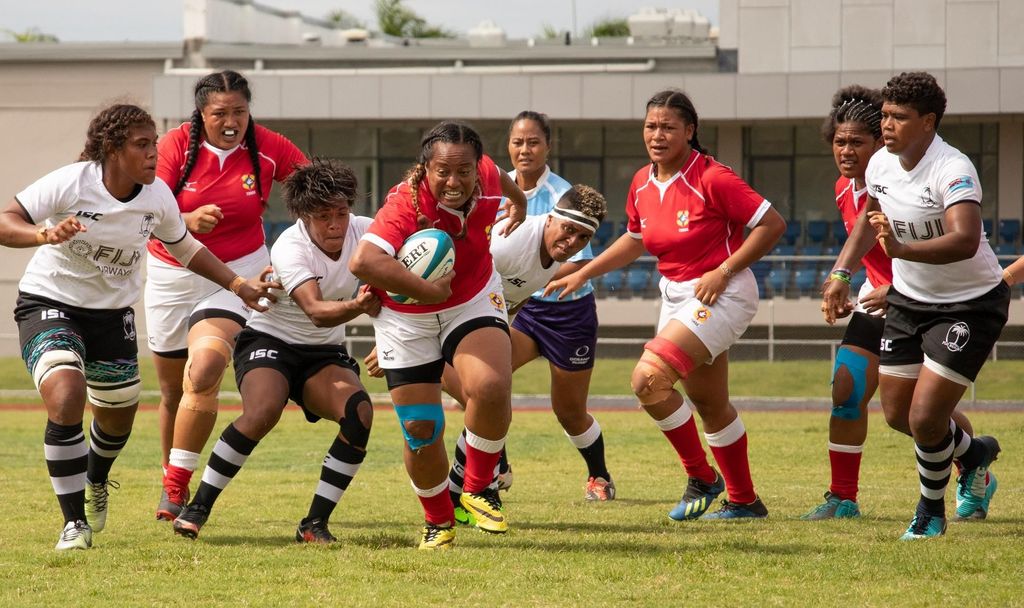Fiji held the Oceania Rugby Women’s Championships in both sevens and 15s in November, and it is hoped that the tournaments can help drive standards in the Pacific.
Hosts Fiji retained their 15s title, beating Samoa 43-12 on the final day at Churchill Park in Lautoka.
For captain Rusila Nagasau (pictured), victory was the latest step on a long journey that she hopes will end with the country’s women receiving equal billing with their male counterparts.
“Back in 2007 there was not much rugby and from there we started trying to develop rugby, especially for women. I think that is our biggest challenge now in Fiji,” Nagasau said.
“Back then we got lots and lots of comments from men, from people passing by and seeing us training and giving us comments.
“I think that’s the biggest challenge for us. Rugby is not just a men’s game, but the love of rugby I think is in our blood. In Fiji, it is our main game, [especially] sevens.
Changing mindsets
“We love to see our men go out there and showcase their talent, and I think as women we have that talent and we’re trying to develop it.”

One of the main problems faced by Nagasau and her team-mates in Fiji – as in other Pacific Island nations – is convincing men that they should be allowed to pick up a ball in the first place.
“It’s very hard for us to play rugby, especially in the rural areas,” she added. “It’s still the old mindset, I think it’s the culture here in Fiji. [It needs] the development officers to go out there and spend time.”
Nagasau is keen to volunteer in those rural areas away from the country’s main island in an attempt to unearth talent and grow player numbers.
Competing in the Oceania Rugby Women’s Sevens Championship, meanwhile, brought her into contact with two of the game’s biggest teams.
Inspiration
Australia held off New Zealand in the final to win the title, and although both teams rested most of their star names the tournament offered a glimpse of more professional set-ups.
“To see the New Zealand and Australia women’s teams, I think they get the same care as the men’s,” Nagasau said.
“But for us, that’s the biggest difference. I think the biggest thing for me is if they can treat the women’s team like a men’s team we will develop a lot of sevens women’s teams in Fiji.
“The experiences going out there and meeting them, we just look up to them.
“I think a lot of girls are here watching them and looking at them, the biggest challenge is to be like them. But for me playing against them is the biggest challenge for me.
“I love watching them play, that’s what inspired me.”
A game for all
November marked the first appearance of a female Tongan side since the Women’s Pacific Tri-Nations 12 years ago.
In March, Tongan Prime Minister Akilisi Pohiva overturned a decision that appeared to ban women and girls from playing rugby. It is unsurprising, therefore, that Tonga women’s team manager Fehoko Tu’ivai identifies with many of the problems outlined by Nagasau in Fiji.
That does not stop Tu’ivai from harbouring grand ambitions, however, and she believes her country should dream big when it comes to the Women’s Rugby World Cup.
“We have a couple of challenges but mainly with our culture,” she said. “Because back at home rugby is a men’s game.
“Even though it’s a men’s game, heaps of girls are interested in rugby and we are hoping we can change that mindset.
“Don’t look at it as men’s rugby but look at it as a game for everyone, because we do believe that for us in Tonga we have more chance to be in a World Cup semi-final than our men’s team.
Empowering women

“So, those are the things that we would like to prove to our fans at home. That we can do this, women can play rugby.”
Tu’ivai, who was part of the squad when Tonga hosted the 2006 Women’s Pacific Tri-Nations, is determined to ensure that it is not another dozen years before the country’s female players take to the international stage again.
“This Oceania Rugby Women’s Championship will play an incredible part in building a platform to further promote and develop women’s rugby in the 15s in Tonga,” Tu’ivai said.
“[Providing] key development in performance pathways for our girls and young women, providing an opportunity and empowering young girls to represent our country and play regular international test rugby.
“Also, this tournament has showcased the strength of our international women’s rugby and it’s providing a platform for our women’s 15s team to work towards Women’s Rugby World Cup 2021.
“We want our women to have an equal footing with the men to be the best they can be in rugby for a chance to represent our country.”





